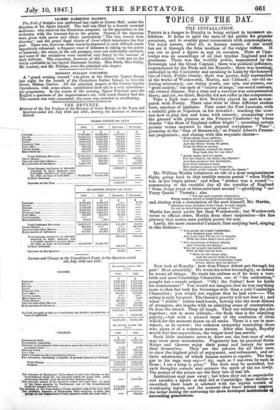TOPICS OF THE DAY.
THE INSTALLATION.
THERE is a danger to Royalty in being subject to incessant ex- hibition. It helps to spoil the taste of the public for grander occasions' and to overlay great ceremonials with commonplaces. Yet royal nature, after all, is human nature, if one could but see it through the false medium of the vulgar triflers. It can cut as good a figure as any on occasion. Here at Cam- bridge was an assemblage of all that typifies England and its greatness. There was the worldly power, represented by the Sovereign and the Great Captain ,• there was political influence, impersonated by the Peels and the Russells ; there was learning, embodied in the University and speaking in Latin by the honeyed lips of Crick, Public Orator ' - there was poetry, duly represented in the works of Wordsworth, Martin_, and Catnach ; our old en- during aristocracy, our rising youth, our arts; our science, our " good society," our mob of "society at large," our social customs, our eternal dinners. Not a class nor a vocation was unrepresented there; and yet, we think, Royalty did not suffer in the comparison. Take a high test-see how Royalty played its part as corn- pared with Poetry. Three odes were in three different studies born, emulous of applause. First came the Poet Laureate, with a tasteful gibe at Napoleon in his downfall ; teaching the cour- tier how to play fast and loose with censure ; scampering over the ground with glances at the Princess Charlotte-by whose demise "the Rose of England suffers blight "; recording certain prosaic verses imputed to that general coryphteus "Time" • glancing at the "Star of Brunswick," at Prince Albert's Protest-
ant progenitors ; and closing with this exquisite chorus-
"What shield more sublime,
E'er was blazoned or sung ?
And the Prince whom we greet, Prom its Hero is sprung.
Resound, resound the strain.
That hails him for our own!
"Again, again, and yet again, For the Church, the State, the Throne I And that presence fair and bright, Ever blest wherever seen, Who deigns to grace our festal rite,
The Pride of the Islands, Victoria the Queen."
Mr. William Martin volunteers an ode of a most magnanimous flight, going back to that terribly remote period "when Hellas was in her virgin prime," and when "silence was a sound"- summoning to the eventful day all the notables of England "from fungy ,crypt or brier-entwined mound "-glorifying "our Faery Queen ' Victoria ; also " Our fair and youthful Chancellor, Whose malden sword of knighthood is high honour" •
and closing with a description of the poet himself, Mr. Martin,
"Plucking some thoughts from Chaos, in rude rhyme, To sail as faded leaves upon the stream of Time."
Martin has more poetic fire than Wordsworth; but Wordsworth wrote to official order, Martin from sheer inspiration-the fine phrensy that makes men publish poetry for sale. Lastly, the more immortal Catnach, that undying bard, singing in this fashion-
.. You people an round Cambridge,
One moment pray attend.
And your time I'll try for to beguile, With the lines that I have pen'd:
" It's concerning of Prince Albert, And Victoria our Queen ; Then let nought but mirth and jollity With us this day be seen.
"Then let the music play, And the merry bells to ring, To welcome unto Cambridge town Prince Albert and our Queen."
Now look at Royalty : how does Prince Albert get through his part? Most admirably. He wears his robes becomingly, as indeed he wears all things. He reads his address as if he were a veri- table and mere Cambridge Chancellor, one of "the authorities,"
nought but a simple subject. " Oh I the Father how he holds his countenance I" You would not imagine that he was anything more to that fair lady his Sovereign-wife than a cold Cambridge Chancellor ; you would not suppose that he bad ever- The acting is only too good. The Queen's gravity will not bear it ; and when " Albert " retires backwards bowing like the most distant of strangers, she laughs with an admiring sense of contrarieties. So does the crowd. They all laugh. They are relishing the joke together; not in mere ridicule,-far from that is the admiring gayety,-but with a pleased sense of the confusion of ideas which for the moment mixes up all ranks. There is a use in mer- riment, as in. sorrow ; the common sympathy reminding those who share it of a common nature. After that laugh, Royalty would feel less supercilious, the vulgar herd le s servile. Such little incidents serve to draw out the best uses of what may seem mere mummeries. Pageantry has its practical fruits. Kings and Queens enjoy their pomp and luxury for more than themselves. They are the proxies for all their race, to show the highest pitch of enjoyment, and refinement, and ar-
tistic adornment, of which human nature is capable. The beg- gar in his rags may say-" Ay, such as I can even be such as those ; I am a-king en posse." The flesh may be mortified, but such thoughts console and animate the spirit of the too lowly. The pomps of the palace are the fairy tale of real life. Institutions may pass away ; but when they cut so respectable and amiable a figure as they did at Cambridge, their decline is smoothed, their tomb is adorned with the myrtle wreath of worshiping regret, and the memory they leave behind inspires the better feeling for nurturing the more developed institutions of succeeding generations.


























 Previous page
Previous page